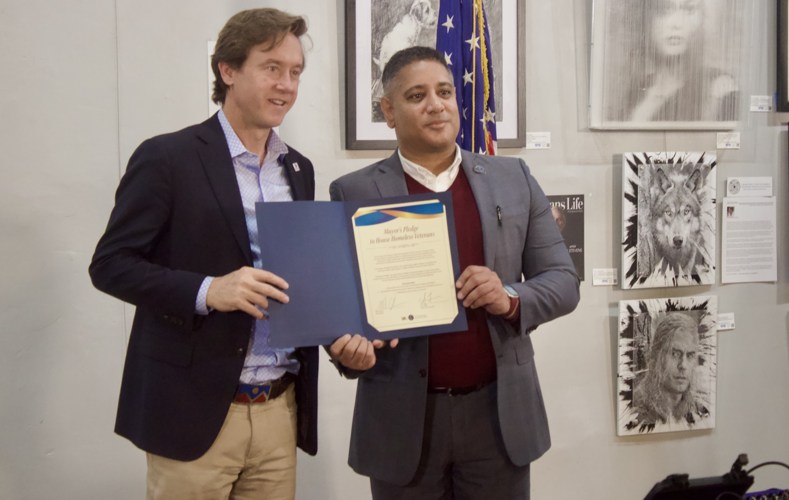Mayor claims Denver has ended street homelessness among veterans

Navy veteran Brian Asbeck signs the back of his own painting with Denver Mayor Mike Johnston, who plans to hang the painting in his office, while announcing Denver has ended the cycle of veterans living on the streets at The Veterans of Foreign Wars Post 1 on Thursday, Dec. 19 in Denver, Colorado.
Noah Festenstein noah.festenstein@denvergazette.com
Brian Asbeck, a Navy veteran who served in Iraq and Afghanistan from 2003 to 2007, found himself living on the streets of Denver a little over a decade later.
Asbeck said he moved to Denver three years ago, “hoping for a fresh start.”
“But (I) quickly found myself living out of my vehicle after a hardship,” he said.
Asbeck, now 40, didn’t elaborate on how he became homeless.
A nationwide count in January put the number of homeless veterans at 35,574, a 7% increase from the survey a year before. Notably, the number of “unsheltered” veterans rose by 14 percent between 2022 and 2023, though the total number is fewer by half compared to 2009.
The Navy veteran said his main challenges while living on the streets were staying warm, finding food and obtaining “basic necessities,” he said.
“I faced a lot of different issues,” he said.
On Thursday, Asbeck joined Denver Mayor Mike Johnston, who claimed that the city has “ended the cycle of street homelessness for veterans in Denver.”
“That means for the first time ever, no veteran has to sleep on the streets in our city,” Johnston said at The Veterans of Foreign Wars Post 1.
Johnston had announced his campaign aiming to end veteran homelessness in early June. In that news conference, Johnston said the city is trying to reach what is known as “functional zero” — meaning more veterans exiting shelter find a home than ending up back on the streets.
He said Denver would be the first city to do so.
Such a claim is actually common. Last May, Dallas officials also declared an effective end to veteran homelessness. And in 2015, New York City, citing federal officials, claimed to have ended chronic veteran homelessness.
Denver officials identified more than 100 homeless veterans since the summer and moved them into temporary housing, according to Johnston’s office.
Prior to today, only 18 veterans were living on the streets of Denver, the mayor’s office said. That meant the city was working to shelter a much smaller population.
And while Johnston maintained that his administration has “ended the cycle of street homelessness for veterans,” six of the 18 actually refused housing, while 12 transitioned into the city’s temporary, non-congregate homeless shelter program.
The Metro Denver Homeless Initiative previously said about 10% of the homeless in Denver are veterans.
The group pegged Denver’s “unsheltered” veteran homeless population at 114 during its January point-in-time count, while reporting 431 total homeless veterans. “Unsheltered” homelessness is a category that refers to people who live and sleep in public places, such as in parks, under bridges or in cars.
Amir Farooqi, interim executive director of the Veterans Affairs Eastern Colorado Healthcare System, said officials use a data system to track homeless veterans.
“This community has been able to identify and match the right resources for housing of veterans quicker than ever,” he said, citing collaboration with partners to bring veterans off of the streets and offer them housing and healthcare support.
Across eastern Colorado, the agency housed 732 veterans in 2024, according to Farooqi.
“No veteran should be homeless in this nation that they fought to defend,” he said.
Jamie Rife, director of the city’s Department of Housing Stability, touted Denver’s new ability to track homeless veterans living on the streets.
“Last month, Denver became one of the largest cities in the nation to do something called quality data on veterans. What that means is that right now, we can tell you the exact number of veterans staying outdoors, who they are, what their names are and what their needs are,” Rife said.
At Thursday’s news conference, both Farooqi and Johnston signed a declaration called the “mayor’s pledge to house homeless veterans.”
The move was in response to the VA announcement on Wednesday vowing to spread “hundreds of millions of dollars in funding to organizations that help rapidly rehouse veterans and their families.”
Douglas County, 20 miles south of Denver, recently claimed it has reached “functional zero” when it comes to veteran homelessness.
County officials there, too, attributed that success to quality data, in particular, a database that compiles a comprehensive, updated list of every homeless veteran in the community.
“We are excited about Douglas County’s progress. We want to work together with them. And we think this is a great step forward for us,” Johnston said.
In response, Commissioner Abe Laydon, who is leading Douglas County’s campaign against homelessness, applauded Denver’s efforts.
“My hope is that Denver will continue to partner on the ‘secret sauce’ to tackling homelessness successfully — co-response, which will help us all save more money and serve more citizens,” Laydon said.
Since July 2023, Denver has moved more than 2,200 homeless people indoors in its “housing first” approach to homelessness. So far, 857 of them have secured permanent housing, according to city data.
Denver expected to spend $155 million on its homeless initiative between July 2023 and the end of 2024 — $65 million more than Johnston previously said it would cost.
Against this spending backdrop, the latest count showed the total number of homeless people in Denver actually ballooned from 5,818 last year to 6,539 this year. And the city saw only 150 fewer “unsheltered” homeless people when compared to last year’s count — data that puzzled one councilmember a few months ago and led another to accuse the Johnston administration of having a “spend first, ask questions later mindset.”
The low number of homeless veterans in Denver is the result of expansive outreach, expanded transitional housing capacity, improved facilities and a partnership with the U.S. Department of Veterans Affairs, Denver officials said on Thursday.
“We now can quickly bring those veterans into transitional housing. We can put them into a safe, stable and private place to lay their head every single night. We know where all our veterans are. We know where to find them. And we have housing available for those in need,” Johnston said.
Asbeck, who said he now lives a “self-sustaining” life in an apartment with the help of what Denver officials are calling a “game-changing” strategy to identify every homeless veteran in the city and offer them housing, said searching for resources as a homeless person was “not comfortable.”
“It’s not necessarily what you’re used to. But if you just stick with it for a little while, it pays off tremendously,” he said.






